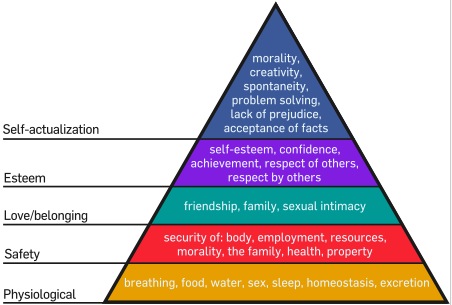Psychologist Abraham Maslow created a 5-level theory of human motivation (Psychology Review, 1943) in which he proposed that peoples’ needs and satisfaction move ‘upwards’ through a common structure which he called a ‘hierarchy of needs.’ Once lower needs of sustenance and safety are met, we aspire to fulfill social, self-esteem, and self-actualization needs. The summary chart looks like this:

(The model made Maslow world famous. The structure of the pyramid itself has been tinkered with over time, for example by Manfred Max-Neef, who sees levels of: subsistence, protection, affection, understanding, participation, leisure, creation, identity, freedom.) But the core insight remains: once more basic levels of fulfillment are achieved, and as long as they remain achieved, humans moves up the hierarchy in search of fulfillment.
What does this have to do with MBA admissions essays, and how does this help those struggling with the ‘why an MBA?’ question in particular?
It helps because it provides a quick, reliable guide to the necessary reach of the essay. Too often applicants dwell in and around levels 2 and 3, talking of security and quality of employment, taking care of their family (including elderly or immigrant parents) and developing friendship and contact networks (incl. alumni networks), career progress, and so on.
This is all important. But there is more to say, and Maslow shows the way to developing it. Where is the rest of your motivation going to come from in your life: how will you achieve further self esteem, self-respect, and the respect of others? What will you create? What will put you, personally, to higher plain of self-actualization?
As I tell my clients: A good career and family security are great things to want. But what else is there? What comes after that? You don’t need to aspire to be Nelson Mandela or Mother Theresa, but you do need to reach into yourself and ask: ‘My levels 4 and 5 – what are they, for me? What would actualizing myself at these levels look like? And how will an MBA be part of what takes me there?’
